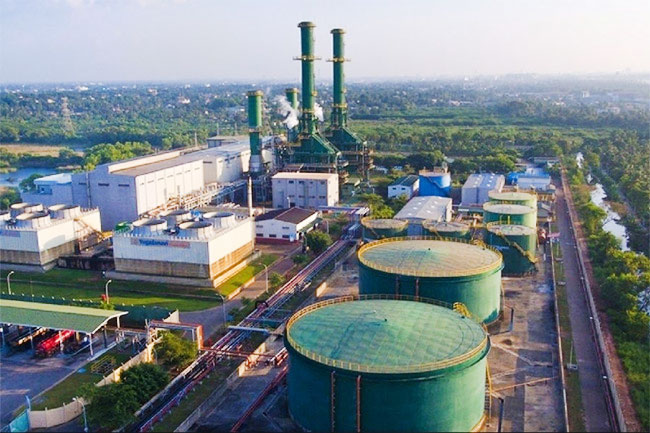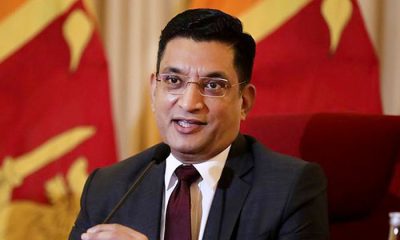News
JVP, too, moves court against deal with US company

By Chitra Weerarathne and A.J.A. Abeynayake
The JVP yesterday (26) filed a writ application in the Court of Appeal requesting it to declare null and void a Cabinet decision to transfer 40 percent of the Yugadanavi Power Plant to US Company, New Fortress Energy Inc.
Prime Minister Mahinda Rajapaksa and the Cabinet of Ministers, the Ceylon Electricity Board, West Coast Power (Pvt) Ltd, Lakdanavi Limited, the Monetary Board of the Central Bank, the Ceylon Petroleum Corporation have been named as respondents among 43 others.
The JVP’s petition has come in the way of Colombo’s Archbishop Malcolm Cardinal Ranjith and Ven Elle Gunawansa, the Samagi Jana Balavegaya and the Federation of National Organisations (FNO) moving the court against the controversial deal with US energy company,The application has also sought a writ of mandamus on the respondents preventing them from taking any action with regard to the matter until the application is taken up and its examination is concluded.
Former JVP MPs Sunil Handunnetti and Wasantha Samarasinghe are the petitioners.
The petitioners state that the Cabinet decisions undermine the rule of law, the Constitution and democratic principles enshrined in the Constitution and several other statutes, and conventions of democratic governance and Cabinet of Ministers exercising executive powers.
The petitioners state that LTL Holdings (Pvt) Ltd., is the largest power sector engineering company in the country. It was first incorporated in the 1980s as a joint venture of the Ceylon Electricity Board and a multinational group – ABB of Norway.
The Petitioners state that Lakdanavi (Pvt) Ltd., is a fully owned subsidiary of LTL Holdings (Pvt) Ltd., and is a company specialised in engineering, procurement and construction and operations and maintenance in the energy and power generation sector.
They assert that the government has not properly explained particulars of the deal even to the Cabinet of Ministers when transferring the shares of the power plant to the American company.
They have also alleged that the government has not obtained the approval of Parliament for the agreement in question and that the relevant share transfer process has not been carried out in accordance with a formal tender procedure.
They have sought the Appeals Court to issue an order rescinding the decision taken to transfer the shares to the American company and the agreement signed by the government.
In addition, the General Secretary of the SJB MP Ranjith Madduma Bandara filed a Fundamental Rights application in the Supreme Court on 21 Oct., challenging the government decision to transfer 40 per cent of the Kerawalapitiya Power Plant to the US firm.
Latest News
M. A. L. S. Manthrinayake appointed Secretary Ministry of Fisheries, Aquatic, and Ocean Resources

President Anura Kumara Dissanayake has officially appointed Attorney-at-Law M. A. L. S. Manthrinayake as the new Secretary to the Ministry of Fisheries, Aquatic, and Ocean Resources.
The Secretary to the President, Dr. Nandika Sanath Kumanayake, handed over the formal letter of appointment to Attorney-at-Law M. A. L. S. Manthrinayake earlier today (09) at the Presidential Secretariat.
News
Opposition trade union meets AKD’s reps, flays CEB

Controversy over delay in granting relief to electricity consumers:
by Shamindra Ferdinando
Convener of the SJB’s trade union wing, Ananda Palitha, has said that the country expected President Anura Kumara Dissanayake’s intervention to ensure that consumers received the immediate benefit of a downward electricity tariffs revision, which was long overdue.
Palitha told The Island that as NPP leader Dissanayake had assured the public in the run-up to the presidential election (21 Sept.) and, thereafter, an electricity tariff reduction, and the vast majority of electricity consumers had expected 30% to 35% downward tariff revision.
Palitha emphasised that it was up to President Dissanayake to prevent the Ceylon Electricity Board (CEB) from depriving consumers of relief. The President couldn’t go back on his election promise to reduce monthly electricity bills of Rs. 3,000 and Rs 6,000 by Rs. 1,000 and Rs. 3,000, respectively, Palitha said.
Asked whether the trade union intended to campaign for tariff reduction, Palitha said that they had taken the issue with Director General and Deputy Director General of the Public Utilities Commission of Sri Lanka (PUCSL) on 01 Nov. and subsequently written to President Dissanayake seeking his intervention.
The trade unionist said that in spite of the change of government the CEB seemed to be determined not to mend its ways. Having repeatedly assured the country of a much-touted system change, the ruling party must not allow the CEB to have its way in dealing with electricity consumers.
Palitha alleged that the CEB had deliberately delayed the submission of its tariff proposals to the PUCSL.
Responding to another question, Palitha said their trade union collective had received an opportunity to make a comprehensive presentation on behalf of electricity consumers to President Dissanayake’s senior aides at the Presidential Secretariat on 06 Dec.
“We explained how the top CEB management, particularly influential engineers, manipulated the whole pricing process to their advantage at the expense of the people struggling to make ends meet,” Palitha said, adding he hoped that the presidential aides had realized the gravity of the developing situation, particularly as within hours after their meeting the country was told anticipated tariff revision couldn’t be granted.
“How could the CEB declare that the tariff revision couldn’t be implemented after having offered 6% to 11% tariff reduction just a couple of weeks ago?” Palitha said. The incumbent political leadership couldn’t absolve itself of the responsibility for ensuring the CEB adhered to a Cabinet decision taken during the previous administration that there would be four tariff revisions yearly.
Palitha disclosed that the SJB trade unions had taken up with the President’s team Trade, Commerce, Food Security and Cooperative Development Minister Wasantha Samarasinghe’s recent declaration that electricity consumers would be given a 30% tariff reduction over a period of three years whereas his leader had promised immediate relief.
Regardless of the CEB’s recommendations, the final decision in respect of electricity tariffs would be taken by the PUC, Palitha said, urging the NPP representatives to speak in one voice.
Palitha mentioned that both the government and the CEB owed an explanation to the public regarding the sudden declaration made by the latter that tariff reduction couldn’t be made as the government trade union leader at the CEB, Ranjan Jayalal, had disclosed on a live television debate the CEB earned Rs 62 bn profits in 2023 and so far Rs 142 bn this year. Jayalal made the declaration in support of his demand for thumping year-end bonuses for CEB employees, Palitha said, declaring providing relief to consumers should be the government’s priority.
Palitha said that Dissanayake who had been at the helm of the JVP since 2014 couldn’t be unaware how their union and other interested parties won their demands at the expense of not only the consumers but the entire country as well.
The SJB representative said that the country was yet to receive the benefit of the bulk of electricity being generated through hydro power.
News
SLMC calls for probe into agreement signed with bondholders, others ahead of presidential election

Sri Lanka Muslim Congress (SLMC) leader Rauf Hakeem, MP, demands to know why the Rajapaksa-Wickremesinghe government entered into an agreement with bondholders and commercial creditors just 48 hours before the presidential election.
MP Hakeem told The Island that he raised the issue at hand in Parliament last week when Parliament deliberated the Vote-on-Account. He drew the attention of Parliament to what he called a matter of critical importance related to Sri Lanka’s recent debt restructuring. The SLMC leader said: “While it is undeniable that reaching an agreement with bondholders and commercial creditors was crucial to steering our nation out of its economic crisis, troubling questions linger about the integrity of this process.
It is concerning that the agreement with bondholders was finalised merely two days before the Presidential elections, raising doubts about whether this, too, was exploited to serve the interests of a select few. We are reminded of the controversial $500 million bond repayment saga during the Rajapaksa administration. Similarly, the current restructuring raises the specter of insider trading—where investors, potentially armed with privileged information, acquired Sri Lankan bonds at deep discounts, only to negotiate settlements at face value, possibly in collusion with the administration.
This Parliament owes it to the people of Sri Lanka to demand transparency and accountability by initiating an independent inquiry to determine the purchase prices of these bonds, the extent of concessions offered, and whether public trust was compromised in favour of private gain. Another matter of profound national importance—the Domestic Debt Optimization (DDO) initiative, which I contend represents Sri Lanka’s third and most extensive bond scandal. This scheme, orchestrated under the stewardship of then-Finance Minister Ranil Wickremesinghe, mirrors the malfeasance of previous bond scams and inflicts severe economic injustice upon our working class.
In February 2015, the Central Bank of Sri Lanka (CBSL) was embroiled in a bond scandal involving the issuance of Rs. 1 billion in 30-year government bonds. The auction controversially accepted bids totaling Rs. 10 billion, significantly exceeding the initial offer, leading to an estimated loss of over $11 million for the nation. This incident, among others, has eroded public trust in our financial institutions.
The DDO was presented as a strategy to reduce the government’s liability to the public. However, a critical examination reveals a more sinister agenda. The Employees’ Provident Fund (EPF), the primary retirement savings of our private-sector employees, was compelled to exchange its Treasury bonds under the DDO programme
This maneuver effectively transferred substantial wealth from the EPF to a select group of beneficiaries, including: Licensed Primary Dealers, · Licensed Commercial Banks and· Non-Bank Financial Institutions
The exact magnitude of the windfall gains reaped by these entities remains undisclosed, raising serious concerns about transparency and accountability.
Calling for independent inquiry, MP Hakeem said: It is imperative that an independent investigation be conducted to: (i) Quantify the Wealth Transfer: Determine the total value siphoned from the working population’s retirement funds to the affluent few (ii) Assess Tax Revenue: Ascertain the amount of tax revenue the government accrued from these windfall profits.
Such an inquiry is essential to uphold justice and restore public confidence in our financial governance, the former Minister said.
-

 Business6 days ago
Business6 days agoLaunching of Curtin University Colombo, a landmark in Australia-SL educational ties
-

 Editorial7 days ago
Editorial7 days agoThe hunt continues
-

 News7 days ago
News7 days agoChief Magistrate chides CID for arresting messenger rather than culprit
-

 News5 days ago
News5 days agoSabry: Defeat of LTTE terrorism liberated all Sri Lankans
-

 Features7 days ago
Features7 days agoTime of hope and a promise to keep
-

 Business7 days ago
Business7 days agoIn SL’s efforts to scale-up solar energy, grid connectivity seen as challenge
-

 Opinion7 days ago
Opinion7 days agoStemming tide of misinformation
-

 Features7 days ago
Features7 days agoA few thoughts on English language teaching in the era of Generative AI




















